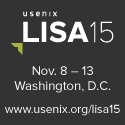21. Can you automatically patch software across your entire fleet?
If OS installation is automated then all machines start out the same. If patching is automated then all machines stay current. Consistency is a good thing.
Security updates are very important because the reliability of your systems requires them. Non-security related updates are important because the reliability of your system requires them and because it brings new features to your customers. Withholding new patches is like a parent withholding love. Who raised you?
Application patching is just as critical as patching OSs. Users don't make the distinction between "OS" and "application", especially if an application is installed widely. The bad guys that write malware don't make a distinction either.
I wish banks had to publish their patching process so I could decide where to keep my money.
The alternative to automation is visiting each machine one at a time. This annoys users, wastes their time, and it a stupid use of your time. With the proliferation of laptops it isn't even reasonable to think you can visit every machine.
When possible, updates should happen silently. If they require a reboot or other interruptions, users should have the ability to delay the update. However, there should be a limit; maybe 2 weeks. However the deadline should be adjustable so that emergency security fixes can happen sooner.
For More Information
See below links for more information on this topic:
